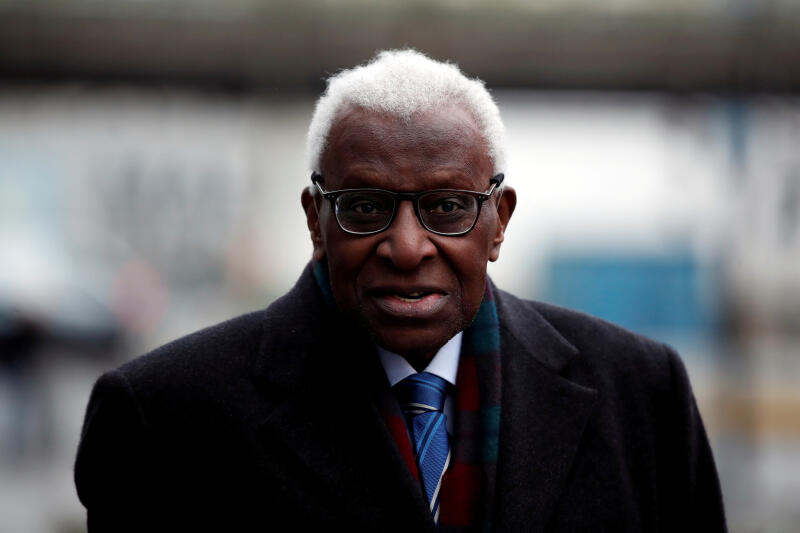Athletics: Former IAAF boss Lamine Diack stands trial for taking bribes to clear Russians of doping
Sign up now: Get the biggest sports news in your inbox

Lamine Diack has previously denied wrongdoing.
PHOTO: REUTERS
Follow topic:
PARIS (REUTERS, AFP) - Lamine Diack, the former head of the governing body for world athletics, was at the heart of a corruption scam that saw Russian athletes pay six-figure sums to have their names erased from doping lists, prosecutors told a French court on Monday (June 8).
Wearing a dark grey suit, Diack, 87, who led the International Association of Athletics Federations (IAAF) from 1999 to 2015, stood before the French judges on the first day of trial as charges of corruption, money laundering and breach of trust were read out.
Prosecutors allege Diack solicited bribes totalling €3.45 million (S$5.42 million) from athletes suspected of doping to cover up test results and let them continue competing, including in the 2012 London Olympics. They also say he obtained €1.5 million of Russian funds while negotiating sponsorship and television rights to help finance Macky Sall's campaign for the 2012 Senegal presidential election - which he won - in exchange for the IAAF's anti-doping arm covering up or delaying offences by 23 Russian athletes.
Diack has previously denied wrongdoing. He spoke yesterday only to confirm his identity and is due to testify on Wednesday.
"I have very poor hearing... A very complicated state of health... But I'm here," Diack said.
His lawyer William Bourdon described him as "serene and determined".
"The fact financial exchanges took place is not enough on its own to prove corruption," Bourdon told reporters at the end of the first session.
Diack, who has been under house arrest ahead of the trial, is charged with "giving and receiving bribes", "breach of trust" and "organised money laundering".
He faces up to 10 years in jail if convicted.
His son, Papa Massata, who fled France for his native Senegal after the French investigation began, is also accused of playing a role in the plot, and is being tried in absentia.
He was implicated through a payment of €450,000 from Russian runner Liliya Shobukhova, allegedly to have her blood passport case delayed in order to compete in the 2012 Olympic marathon, as revealed by German broadcaster ARD in 2014.
Diack junior is accused of playing a "central role" in the network of corruption and is charged with "money laundering", "giving bribes" and "aiding the receiving of bribes".
The court rejected a request by his French lawyer that the trial be postponed because coronavirus border restrictions meant his Senegalese lawyers could not be present. Senegal has refused to extradite him.
Four other defendants have been charged in the case: Habib Cisse, Diack's former lawyer at the IAAF; Gabriel Dolle, who oversaw doping tests at the IAAF; former head of Russian athletics Valentin Balakhnitchev, and former Russian athletics' head coach Alexei Melnikov. Balakhnitchev and Melnikov were not in court.
Dolle denied taking bribes in order to allow Russian athletes to compete. He told the court he had agreed only to keep a low profile on the large number of positive Russian doping tests to help the IAAF find sponsors.
"Mr Diack had asked me to consider the fact that the IAAF was in a perilous financial state and needed sponsors," he told the court.
"There was never any question of allowing the Russian athletes to participate in international competitions."
The trial, following a four-year investigation by the French Financial Prosecutor's Office, was originally scheduled to start on January 13 but was delayed to examine new evidence. m. The trial is due to run for six days.
REUTERS, AGENCE FRANCE-PRESSE

